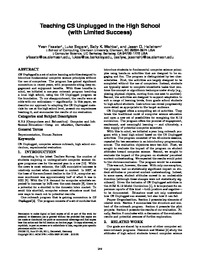Teaching CS unplugged in the high school (with limited success)Yvon Feaster, Luke Segars, Sally K. Wahba, Jason O. Hallstrom
Publikationsdatum:
Zu finden in: ITiCSE 2011 (Seite 248 bis 252), 2011
|
 |
 Diese Seite wurde seit 2 Jahren inhaltlich nicht mehr aktualisiert.
Unter Umständen ist sie nicht mehr aktuell.
Diese Seite wurde seit 2 Jahren inhaltlich nicht mehr aktualisiert.
Unter Umständen ist sie nicht mehr aktuell.
 Zusammenfassungen
Zusammenfassungen
CS Unplugged is a set of active learning activities designed to introduce fundamental computer science principles without the use of computers. The program has gained significant momentum in recent years, with proponents citing deep engagement and enjoyment benefits. With these benefits in mind, we initiated a one-year outreach program involving a local high school, using the CS Unplugged program as the foundation. To our disappointment, the results were at odds with our enthusiasm --- significantly. In this paper, we describe our approach to adapting the CS Unplugged materials for use at the high school level, present our experiences teaching it, and summarize the results of our evaluation.
Von Yvon Feaster, Luke Segars, Sally K. Wahba, Jason O. Hallstrom im Konferenz-Band ITiCSE 2011 im Text Teaching CS unplugged in the high school (with limited success) (2011) We have shown that the CS Unplugged program
we presented had, on average, no impact on student
attitudes toward computer science or their perceived content
understanding. We believe there are several causes for
this result. First, based on our experience with presenting
CS Unplugged activities to other groups, we believe high
school students do not find kinesthetic activities of this kind
as exciting as middle or elementary school students, such as
the groups participating in [6–8]. Although we attempted
to modify the activities to be more suitable for high school
participants, we observed that these students seemed less
motivated to participate than we had hoped. Second, the
selected students were already in a computer science programming
class. We felt they would be more interested in
the activities. However, after reviewing the data and reflecting
on our experiences with these students, we believe
most of the students perceived themselves as “experienced
programmers”and so may have been less interested in spending
time learning these concepts. Last, most successful CS
Unplugged-based programs were either summer workshops
or after school programs. Participants in these programs
tend to be self-selected, with a strong pre-existing interest.
Von Yvon Feaster, Luke Segars, Sally K. Wahba, Jason O. Hallstrom im Konferenz-Band ITiCSE 2011 im Text Teaching CS unplugged in the high school (with limited success) (2011)  Dieses Konferenz-Paper erwähnt ...
Dieses Konferenz-Paper erwähnt ...
 Dieses Konferenz-Paper erwähnt vermutlich nicht ...
Dieses Konferenz-Paper erwähnt vermutlich nicht ... 
 Nicht erwähnte Begriffe | Informatik-Unterricht (Fachinformatik), Informatikunterricht in der Schule |
 Tagcloud
Tagcloud
 Zitationsgraph
Zitationsgraph
 Zitationsgraph (Beta-Test mit vis.js)
Zitationsgraph (Beta-Test mit vis.js)
 2 Erwähnungen
2 Erwähnungen 
- Proceedings of the Workshop in Primary and Secondary Computing Education, WiPSCE 2015, London, United Kingdom, November 9-11, 2015 (Judith Gal-Ezer, Sue Sentance, Jan Vahrenhold) (2015)
- Teaching Computer Science to 5-7 year-olds - An initial study with Scratch, Cubelets and unplugged computing (Benjamin Wohl, Barry Porter, Sarah Clinch) (2015)


- Teaching Computer Science to 5-7 year-olds - An initial study with Scratch, Cubelets and unplugged computing (Benjamin Wohl, Barry Porter, Sarah Clinch) (2015)
- Fachliche Bildung in der digitalen Welt - Digitalisierung, Big Data und KI im Forschungsfokus von 15 Fachdidaktiken (Volker Frederking, Ralf Romeike) (2022)


- Informatische Bildung in der digitalen Welt - Die digitale Transformation im Fokus der Informatikdidaktik ± Theorie, Empirie, Praxis (Ralf Romeike, Stefan Seegerer)

- Informatische Bildung in der digitalen Welt - Die digitale Transformation im Fokus der Informatikdidaktik ± Theorie, Empirie, Praxis (Ralf Romeike, Stefan Seegerer)
 Anderswo finden
Anderswo finden
 Volltext dieses Dokuments
Volltext dieses Dokuments
 | Teaching CS unplugged in the high school (with limited success): Artikel als Volltext ( : :  , 456 kByte) , 456 kByte) |
 Anderswo suchen
Anderswo suchen 
 Beat und dieses Konferenz-Paper
Beat und dieses Konferenz-Paper
Beat hat Dieses Konferenz-Paper während seiner Zeit am Institut für Medien und Schule (IMS) ins Biblionetz aufgenommen. Beat besitzt kein physisches, aber ein digitales Exemplar. (das er aber aus Urheberrechtsgründen nicht einfach weitergeben darf). Aufgrund der wenigen Einträge im Biblionetz scheint er es nicht wirklich gelesen zu haben. Es gibt bisher auch nur wenige Objekte im Biblionetz, die dieses Werk zitieren.










 Biblionetz-History
Biblionetz-History